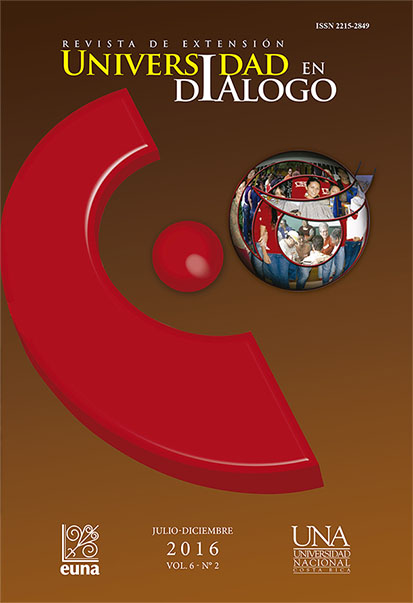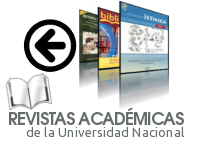The Curricularization of University Extension: The Student Participation from the Experience of Health Promotion and Local Entrepreneurship Project in Puriscal, Costa Rica
DOI:
https://doi.org/10.15359/udre.6-2.8Keywords:
curricularization, teaching, extension, students, academic staff, participatory processes.Abstract
The National University was created in 1973 under a humanist, democratic and inclusive perspective. This house of studies emerged as a higher education option to serve as an alternative offered to the rural and urban social sectors whose access to university education was limited at that time; in addition, its creation responded to the concerns of the new generations of counting with an accessible center of higher studies and academic excellence in the country. Since its creation, the National University adopted the integration of three fundamental pillars for the fulfillment of its raison d’être: teaching, research and extension. This presentation makes emphasis on the university extension as an axis that integrates processes of creation and development of capabilities of its social, institutional and local actors, and social transformation to a higher quality of life for the communities (A, 2009). Over the years, the role of university extension has been weakened, despite the fact that it is one of the components of the university work that permanently interacts with communities and social groups. However, the integration of that function with teaching and an effective feedback of the curriculum profiles through its implementation is not the common characteristic in the academic work. Consequently, this situation has led to the weakening of the extension over the years and, little by little, this function has been relegated and, as popularly said, it is the academic Cinderella maintained thanks to the motivation of some teachers, who make greater efforts despite the inappropriate conditions they face. The School of Planning and Social Promotion represents a particular case of the curricularization of extension in its curriculum. This specifically happens in the third year of career, when doing an annual internship of 12 credits (6 credits per semester). According to the Internship Program (2014), its goal is “to allow a first approach to the communal, institutional and organizational reality, taking into account the institutional framework in which the different social actors (students, teachers, organizations, enterprises, institutions) live a learning process through the participative construction of actions and potential projects for economic, social and environmental development”. This student practice aims to facilitate the intrinsical union of the theory-practice in the Economic and Social Planning career. The project, funded by the National Council of Rectors, is called “Equity, and Citizen Participation: Health Promotion and local entrepreneurship in Puriscal (EPASOP)”. Its experience serves as a point of departure to support the relevance of the university extension work and student participation. From this approach, it is shown the implications of a curriculum that integrates the extension to the academic training and that generates a student active participation, where the pedagogical process is strengthened with a vision or pedagogical and humanist richness. As added value, this exercise presents the academic, social and individual impact of the curricularization of extension in a university career.References
Aroche, A., Bendicho, M. y Pérez, J. (2012). Las competencias de la extensión universitaria ante las exigencias del desarrollo locales: Universidad Agraria de la Habana. Universidad, evento provincial. Mayabeque, Cuba.
Aroche, A. y Bendicho, M. (2008). La labor extensionista de la sede universitaria ¿trabajo comunitario o educación comunitaria? En I. Trelles y M. Rodríguez (ed.), Universalización y cultura científica para el desarrollo local. La Habana, Cuba.
Aroche, A. (2010). Competencias de la Extensión Universitaria ante los nuevos paradigmas. Plataforma para el debate. En Ministerio de Educación Superior, 7° Congreso Internacional de Educación Superior. Ciudad de la Habana, Palacio de Convenciones.
Ayales, I., Chaverri, P., Chaves, A., Ferrufin, R., Flin, M.,
Flores, R., Leiva, F., Madden, L., Meléndez, N., Navarr, A., Palm, M., Sanch, R., Schule, M. y Silva, E. (1991). Haciendo camino al andar, guía metodológica para la acción comunitaria. Washington, DC.: OEF Internacional.
Boal, A. (2004). Arco iris del deseo. Barcelona: Alba Editorial.
Boal, Augusto. (1998). Teatro legislativo, civilización brasileña. Río de Janeiro, Brasil: Editorial.
Boiser, S. (Octubre, 2002). ¿Y si el desarrollo fuera una emergencia sistémica? Revista del CLAD Reforma y Democracia, 27.
Bordoli, E. (2009). Aportes para pensar la extensión universitaria. En Juan Carrasco, et. al. (Eds.), Extensión en obra: Experiencias, reflexiones, metodologías y abordajes en extensión universitaria. Uruguay: Editorial.
Caja Costarricense del Seguro Social. (2014). Análisis de situación de salud del Área de salud Puriscal-Turrubares 2013. Puriscal: Autor.
Corporación Ecológica y Cultural PENCA DE SABILA. (2006). Plan de Desarrollo Participativo Corregimental 2006-20016. Medellín, Colombia: Alcaldía de Medellín, San Cristóbal.
Cunil, N. (1991). Participación ciudadana. Dilemas y perspectivas para la democratización de los estados latinoamericanos. Caracas, Venezuela: Centro Latinoamericano de Administración para el Desarrollo, CLAD.
D´angelo, O. (2001). Sociedad y educación para el desarrollo humano. La Habana: Publicaciones Acuario.
Fundación DEMUCA. (2009). Guía de herramientas municipales para la promoción del desarrollo económico local. San José, Costa Rica
Fundación DEMUCA. (2009). Guía práctica para el agente de desarrollo local de Centroamérica y República Dominicana. San José Costa Rica: Fundación DEMUCA y CEDET.
Gamboa, R., Gamboa, G., Ballesterto, M. Aragón, G., Zeledón, H., Montero, W., Corder, A. (2011). Vivencias estudiantiles en el Área de los volcanes, en el Área de Conservación Cordillera Vólcanica Central (ACCVC). Escuela de Planificación y Promoción Social, Universidad Nacional, Heredia, Costa Rica.
Gambo, R. Mena, P., Monge, C. y Gutiérrez, M. (2013). Abordaje de problemáticas sociales latinoamericanas desde la academia: competencias del extensionista universitario, ponencia presentada en el XVI congreso, El viejo mundo y el nuevo mundo en la era del diálogo, Antalya, Turquía
Gentili, Pablo. (2012). Pedagogía de la igualdad. Buenos Aires, Argentina: Editores Siglo Veintiuno.
González, Esperanza y Duque, Fernando. (1990) La elección de Juntas Administrativa Locales de Cali, Revista Foro, No 12.
González, Esperanza. (1995). Manual sobre participación y organización para la gestión local. Ediciones Foro Nacional por Colombia.
González, M. (2006). Formulación teórica-metodológica de la promoción cultural de la investigación para la integración de los procesos universitarios extensión e investigación en el Instituto Superior Politécnico José Antonio Echeverría (Tesis doctoral). La Habana, Cuba: CUJAE.
Monge, C. et. al. (2008a).Vínculo interuniversitario para el fortalecimiento socio económico, ambiental y organizacional en Costa Rica. Congreso Latinoamericano de Extensión Universitaria: Organizaciones y sociedad para el desarrollo humano. Costa Rica, Universidad Nacional, Campus Omar Dengo.
Monge, C. et. al. (2008b). Procesos de articulación Universidad-Sociedad: UNA experiencia participativa. Congreso Latinoamericano de Extensión Universitaria: Organizaciones y sociedad para el desarrollo humano. Costa Rica, Universidad Nacional, Campus Omar Dengo.
Monge, C. et. al (2011). Generando capacidades regionales mediante la extensión universitaria: Experiencia de UNA-Sede Regional Chorotega. Revista de Extensión Universidad en Diálogo, 1(2).
Monge, C. et. al. (2012). La educación superior y el trabajo con grupos sociales de atención prioritaria. Revista Calidad en la Educación Superior. Programa de Autoevaluación Académica, 3(1), 247-259.
Programa de Evaluación Académica y Desarrollo Profesional. (2011). El sistema de desarrollo profesional de la Universidad Nacional. Costa Rica: Autor.
Rosell, L. y Serrano, M. (2014). Educación física y promoción de la salud: Estrategias de intervención en la escuela. Nuevas tendencias en Educación física, deporte y recreación, 25, 186-191.
Sistema de Información Académica. (2010). Base de datos de programas, proyectos y actividades. Costa Rica: Vicerrectoría Académica, Universidad Nacional.
Sobrado, M. (2008). Importancia institucional de la extensión universitaria en los tiempos “líquidos”. Congreso Latinoamericano de Extensión Universitaria: Organizaciones y sociedad para el desarrollo humano. Costa Rica, Universidad Nacional, Campus Omar Dengo.
Tejeda, J. (s. f). Acerca de las competencias profesionales 8 en línea) Revista Herramientas, 56, 8-14, 20-30 y 57). Recuperado de: http://peremarques.pangea.org/dioe/competencias.pdf
Tribunal Electoral de la Universidad Nacional. (1993). Estatuto Orgánico de la Universidad Nacional. Comunicado oficial 03-93, 1993.
Universidad Nacional. (2009). Lineamientos para la gestión de programas, proyectos y actividades. UNA-Gaceta Nº 17.
Universidad Nacional. (2007). Modelo Pedagógico de la Universidad Nacional. Gaceta Universitaria Nº 2. Costa Rica, Heredia.
Downloads
Published
How to Cite
Issue
Section
License

La Revista y cada uno de los artículos que se publican están licenciados por Creative Commons Atribución No comercial Sin derivadas 4.0 Internacional.



